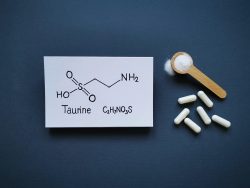 Scientists are highly intrigued by the process of aging and the possibility of slowing it down, which has led to a significant increase in research efforts to better comprehend aging as a biological process. Aging results in numerous physiological changes at different levels, from tiny cellular structures to entire organ systems. As medical research progresses, taurine supplementation has emerged as a highly promising avenue for promoting longevity.
Scientists are highly intrigued by the process of aging and the possibility of slowing it down, which has led to a significant increase in research efforts to better comprehend aging as a biological process. Aging results in numerous physiological changes at different levels, from tiny cellular structures to entire organ systems. As medical research progresses, taurine supplementation has emerged as a highly promising avenue for promoting longevity.
Taurine, a fundamental amino acid found abundantly in our bodies, is a key player in many important bodily functions. From supporting the formation of bile acids to assisting in osmoregulation and protecting against oxidative damage, taurine is a true superstar. However, as we grow older, the amount of taurine circulating in our bodies decreases.
In a recent scientific study published in the journal Science, researchers led by Singh et al. examined the impact of taurine supplementation on lifespan and health in different species such as mice, worms, monkeys, and yeast. The purpose of the study was to investigate whether decreases in taurine levels as we age are linked to the aging process. To do this, the scientists administered taurine or a control solution to middle-aged male and female C57B1/6J mice on a daily basis until they reached the end of their lives.
Surprisingly, mice that were fed taurine lived longer than the control group. The taurine-fed mice lived 10-12% longer than the control group, and at 28 months their life expectancy saw a jump by 18%-25%. Further research on the effects of taurine on longevity showed that supplementation also improved various bodily functions such as muscle, bone, muscle, brain, pancreas, gut, immune system and metabolism in middle-aged mice. Similar positive results were observed in monkeys. Additionally, taurine supplementation had a positive impact on key aging markers. It reduced cellular senescence, protected against telomerase deficiency, improved mitochondrial function, reduced DNA damage, and decreased inflammation.
Additionally, the study discovered that reduced levels of taurine, hypotaurine, and N-acetyl taurine were linked to various health issues such as high blood pressure, inflammation, obesity, and type 2 diabetes. The authors of the study observed that exercise led to higher concentrations of taurine metabolites in the blood, solidifying the existing proof that exercise is beneficial for slowing down aging.
These findings from the study offer convincing support for taurine as a crucial factor for long-lasting health. However, it is important to note that there is currently no evidence to suggest that these benefits also apply to humans.
To view the original scientific study click below:
Taurine deficiency as a driver of aging





